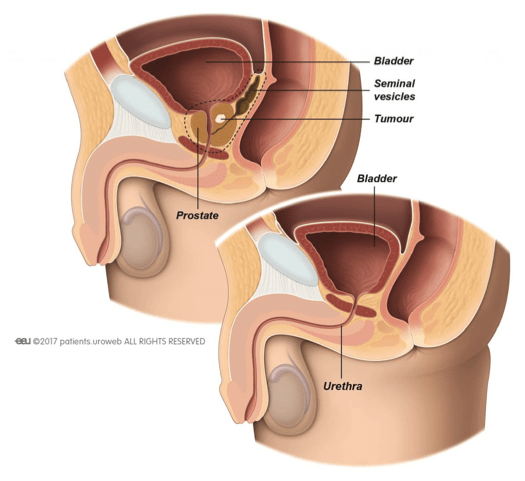
THE BEST IN PROSTATE CANCER SURGERY
WHAT IS A RADICAL PROSTATECTOMY?
A robotic radical prostatectomy is an operation to remove the entire prostate gland, seminal vesicles, and part of the vas deferens. We will also remove the draining lymph nodes to ensure the cancer has not spread.
BENEFITS OF SURGERY VS. RADIATION
| Surgery | Radiation |
|---|---|
|
|
Surgery
- Risks/effects are upfront
- Recovery from the surgery (4-6 weeks)
- No significant long term risks
Radiation
- Risks/effects accumulate over time and occur later in life
- Increased risk of bladder/rectal cancer from effect of radiation
- Possible radiation cystitis/proctitis
- Subsequent treatments can be more difficult
Surgery:
- Incontinence (leakage of urine) – usually occurs with cough/sneeze/sharp movement
- Mostly fixed by 1 month
- Kegel exercises can quicken recovery
Radiation:
- Irritative symptoms – urgency, frequency, burning with urination
- Risk of scarring of urethra in future – more difficult to pass urine
Because of robotics and advanced nerve sparing techniques, most people will have return of satisfactory erections, given some time.
Ultimately, maintaining sexual function depends on your age and sexual function prior to treatment. If needed, medications can be used to help with erectile dysfunction.
HOW IS A PROSTATECTOMY DONE?
- The procedure is usually done as same-day and takes about 3-4 hours.
- After robot docking, the entire prostate and seminal vesicles are separated from the bladder, rectum, and the muscles in the pelvis
- The lymph nodes on both sides in the pelvis are removed
- The bladder is then rejoined to the urethra and a catheter is put through the penis into the bladder to drain the urine and protect the connection
WHAT TO EXPECT?
On days leading up to Surgery
- STOP blood thinners or other medications as discussed with your surgeon
- START enhanced recovery after surgery (ERAS) medications
- Evidence based pathway to help reduce your surgical stress and quicken your recovery after the surgery
- These will be a combination of scheduled and on demand medications to help minimize pain and to avoid narcotics.
- Same Day Surgery: Most patients go home the same day a few hours after the surgery is finished.
- Diet: You will start with a liquid diet a few hours after surgery. It is important to eat light, frequent meals.
- Postoperative pain: Pain should be well controlled and you will have medications as needed. It is important to move around as much as possible.
- Urinary catheter: You can expect to have a urinary catheter draining your bladder (which is placed while you are asleep) for approximately 1 week after the surgery. It is not uncommon to have blood in the urine for a few days after surgery.
- Incentive spirometry: You will be expected to do some very simple breathing exercises to help prevent respiratory infections. Coughing and deep breathing are an important part of your recuperation and help prevent pneumonia and other complications.
- Ambulation: It is very important to get out of bed and begin walking to help prevent blood clots from forming in your legs.
- Constipation/gas cramps: You may experience sluggish bowels for several days following surgery. Keep eating light meals until you pass gas on a more regular basis.
- Pain control: You can expect to have some pain that may require pain medication for up to a week after discharge. Tylenol should be sufficient to control your pain. It is important to stay ahead of the pain.
- Showering: You may shower starting the day after surgery. Do NOT scrub the incisions, let soap and water run down over them. Baths are not recommended.
- Activity: Taking walks is advised. Prolonged sitting or lying in bed should be avoided. Climbing stairs is encouraged but should be taken slowly. Driving should be avoided while you have a catheter. No heavy lifting (greater than 20 pounds) or exercising (jogging, swimming, treadmill, biking) until instructed by your doctor.
- Follow-up appointment: You will see us in the office 1 week after your surgery. You may either call for a follow-up or one will be scheduled for you.
ADVANCED TECHNIQUES: BETTER OUTCOMES AND LESS SIDE EFFECTS
Our Advanced Urologists can offer complex and advanced techniques:
- Same Day Outpatient Surgery
- Advanced Prostate Cancer Center
- We can treat even the most aggressive disease
- Faster Urinary Continence and Return of Erectile Function
COMPREHENSIVE CARE
We have ultramodern purpose built facilities to provide all your care. You will have access to every Super specialist at Advanced to treat all facets of prostate cancer, even the most challenging cases. We have all the expertise in house to help you.
THE ADVANCED DIFFERENCE
Advanced Super Specialists are board certified urologists with exceptional training. They focus on a narrow subset of urology. This superspecialization on a disease state leads to to more experience, greater expertise, and better outcomes. Our experts are world renown for their skill, knowledge, and compassion.
COMPREHENSIVE CARE
We have ultramodern purpose built facilities to provide all your care. You will have access to every Super specialist at Advanced from recurrent urinary infections to clinical trials to the most challenging prostate cancer cases. We have all the expertise in house to help you.
A WINNING TEAM COMMITTED TO YOU
Our award winning team will collaborate with you, your family, and the other providers involved in your care. We think communication is essential in delivering great outcomes. The most important thing to know is that we are here for you.

